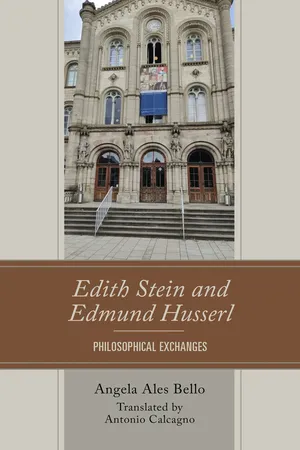
- 225 pages
- English
- PDF
- Available on iOS & Android
eBook - PDF
About this book
This book offers a reconsideration and re-evaluation of the philosophical exchange between Edmund Husserl and Edith Stein by addressing their unique and differing positions in light of the thinkers' shared phenomenological roots. Angela Ales Bello highlights the depth and breadth of the philosophers' thinking on questions related to intersubjectivity, ethics, religion, ontology, gender, anthropology, method, personhood, and psychology.
Frequently asked questions
Yes, you can cancel anytime from the Subscription tab in your account settings on the Perlego website. Your subscription will stay active until the end of your current billing period. Learn how to cancel your subscription.
No, books cannot be downloaded as external files, such as PDFs, for use outside of Perlego. However, you can download books within the Perlego app for offline reading on mobile or tablet. Learn more here.
Perlego offers two plans: Essential and Complete
- Essential is ideal for learners and professionals who enjoy exploring a wide range of subjects. Access the Essential Library with 800,000+ trusted titles and best-sellers across business, personal growth, and the humanities. Includes unlimited reading time and Standard Read Aloud voice.
- Complete: Perfect for advanced learners and researchers needing full, unrestricted access. Unlock 1.4M+ books across hundreds of subjects, including academic and specialized titles. The Complete Plan also includes advanced features like Premium Read Aloud and Research Assistant.
We are an online textbook subscription service, where you can get access to an entire online library for less than the price of a single book per month. With over 1 million books across 1000+ topics, we’ve got you covered! Learn more here.
Look out for the read-aloud symbol on your next book to see if you can listen to it. The read-aloud tool reads text aloud for you, highlighting the text as it is being read. You can pause it, speed it up and slow it down. Learn more here.
Yes! You can use the Perlego app on both iOS or Android devices to read anytime, anywhere — even offline. Perfect for commutes or when you’re on the go.
Please note we cannot support devices running on iOS 13 and Android 7 or earlier. Learn more about using the app.
Please note we cannot support devices running on iOS 13 and Android 7 or earlier. Learn more about using the app.
Yes, you can access Edith Stein and Edmund Husserl by Angela Ales Bello, Antonio Calcagno in PDF and/or ePUB format, as well as other popular books in Philosophy & German History. We have over one million books available in our catalogue for you to explore.
Information
Table of contents
- Cover
- Half Title
- Series Page
- Title Page
- Copyright Page
- Contents
- Acknowledgments
- Introduction
- Chapter 1: The Master and the Disciple: The Philosophical-Phenomenological Formation of Edith Stein
- Chapter 2: The Husserlian Roots of Edith Stein’s Phenomenological Anthropology
- Chapter 3: Einfühlung in Edmund Husserl and Edith Stein
- Chapter 4: Idealism and Realism in Edmund Husserl and Edith Stein
- Chapter 5: The Question of the Human Subject: Edmund Husserl and Edith Stein
- Chapter 6: The Philosophy and Theology of the Person in the Phenomenology of Husserl and Stein
- Chapter 7: Phenomenology, Ontology, and Metaphysics in Edith Stein: A Comparison between Edmund Husserl and Thomas Aquinas
- Chapter 8: The Theoretical Contributions to “Classical” Phenomenology by Edmund Husserl and Edith Stein: The Qualitative Foundation of the Human Sciences
- Chapter 9: Person and State in Edith Stein: A Comparison with Husserl’s Position
- Chapter 10: Dual Anthropology as the Imago Dei
- Chapter 11: Rethinking Europe with Edmund Husserl and Edith Stein
- Conclusion
- Bibliography
- Index
- About the Author